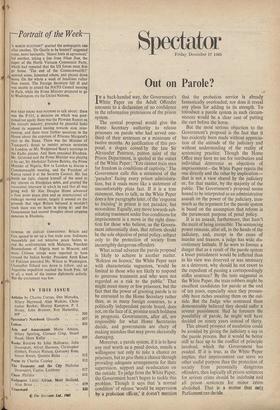Portrait of the Week
'A MARCH ELECTION?' queried the newspapers one after another. 'De Gaulle to be beaten?' suggested some, more hesitantly. 'Hanoi hints at agreement,' led another, taking a line from Nhan Dan, the Paper of the North Vietnam Communist Party, which had repeated that the US forces must first go home. 'The end of the Commonwealth?' queried some, lamented others, and played down more. On the whole a week of headlines rather than events. The Foreign Secretary fell ill and was unable to attend the NATO Council meeting in Paris, while the Prime Minister prepared to go to Washington, via the United Nations.
NOT THAT THERE WAS NOTHING to talk about: there was the F-111, a decision on which was post- poned yet again; there was the Plowden Report on the aircraft industry, preceded by plentiful leaks about its supposed leaning towards state inter- vention, and there were further questions in the House about the expenses of Princess Margaret's visit to the States. There was the Minister of Transport's threat to restrict private motorists in London, or Mr. Wedgwood Benn's warnings to the Radio pirates. And there remained Rhodesia. Mr. Grimond said the Prime Minister was playing it by ear, Sir Abubakar Tafawa Balewa, the Prime Minister of Nigeria, flew to London to discuss a Commonwealth meeting, and the President of Kenya raised it at the Security Council. Mr. Ian Smith sat tight, cleared himself of the need to pay interest on Rhodesian debts, and granted the occasional interview in which he said that all was going well. Sir Alec Douglas Home advanced a four point peace plan and an international oil embargo moved nearer, largely it seemed on the grounds that siqce Britain believed it wouldn't work there was no harm in trying it: and the Government had second thoughts about stopping pensions in Rhodesia.
GENERAL DE GAULLE CAMPAIGNED. Britain. and Eire agreed to set up a free trade area. Indonesia meanwhile put out tentative peace feelers to end the confrontation with Malaysia, President Boumedienne of Algeria went to Moscow, and more Chinese troops were reported to have crossed the Indian border. President Ayub Khan of Pakistan preceded Mr. Wilson to Washington. Chancellor Erhard was down to follow, and an Argentine expedition reached the South Pole. All in all, a week of the intense diplomatic activity. But the excitement was low.






























 Previous page
Previous page